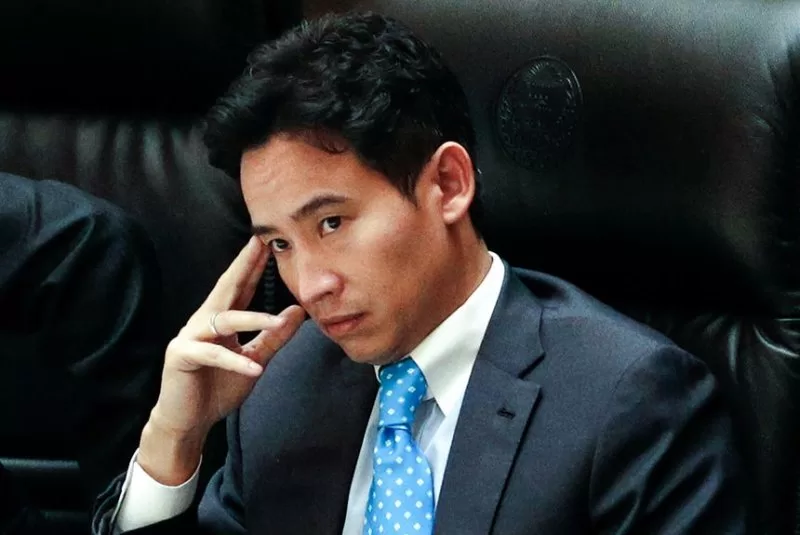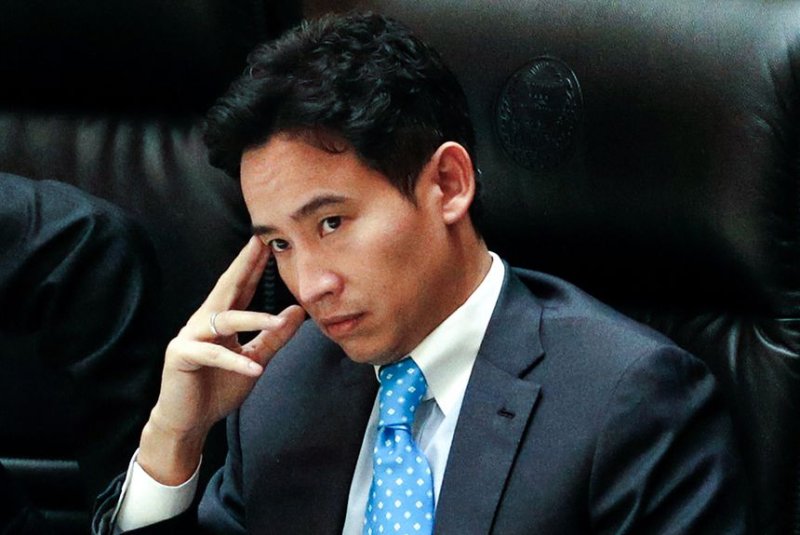Thailand’s constitutional on Wednesday disbanded Pita Limjaroenrat’s Move Forward Party a year after the reformist political movement was thwarted from taking the reins of power after winning a general election in May 2023. File photo by Rungroj Yongrit/EPA-EFE
Aug. 7 (UPI) — Thailand’s Constitutional Court on Wednesday disbanded the country’s Move Forward Party 12 months after the reformist political movement was thwarted from taking the reins of power after winning a general election in May 2023.
The ruling, which was expected after a January ruling that Move Forward’s manifesto pledge to reform royal defamation laws was unconstitutional, also imposed decade-long political bans on leader Pita Limjaroenrat and 11 other senior party members.
The justices on Wednesday found the party’s proposals to dilute the country’s so-called lese majeste law were effectively a bid to overthrow the monarchy of King Vajiralongkorn and the democratic system of government he heads.
The lese majeste laws make it a criminal offense to insult the king.
Move Forward became the 34th political party to be dissolved by the senate-appointed court since 2006 throwing more doubt over the country’s constitution, which was drafted during military rule in 2015, which critics say ultimately vests political power with the military, regardless of who people vote for.
However, the party’s 142 elected members in the 500-seat House of Representatives are expected to simply join another party where they will continue to act as the main opposition to the ruling Peu Thai Party of Prime Minister Srettha Thavisin.
“A new journey has begun. Let’s keep walking together, people,” the party said in a message accompanied by a video on its social media platforms.
Chaithawat Tulathon, one of the banned MPs, addressing fellow Move Forward members in the National Assembly said working with them had been an “honor.”
Move Forward won the most seats and the most votes in last May’s general election and formed a 309-seat coalition with Pita as prime minister. The coalition also featured then-opposition Peu Thai and six other parties with a mandate to loosen the decades-long grip on power of the military and the monarchy.
Tapping into growing anti-establishment voter sentiment the party’s other campaign pledges ranged from slashing the military’s budget and abolishing conscription to breaking up business monopolies, including the country’s lucrative alcohol industry.
The platform which also proposed making same-sex marriage legal and establishing a minimum wage of $13 a day won it broad support across different age groups and regions, including in traditionally military and conservative heartlands, as well as the more liberal Bangkok, the capital.
Move Forward was able to challenge the system with a level of independence buttressed by a funding model based on small personal donations, unlike its rivals which rely on big money from big business concerns.
However, Pita’s bid to become prime minister was blocked in a July 2023 vote by unelected, military-appointed senators, objecting to his proposals to reform lese majeste. Two weeks later, Peu Thai unceremoniously dumped Move Forward from the coalition and nominated real estate developer Thavisin for prime minister.
Outside the court supporters mourned Move Foward’s demise.
“What I like about the Move Forward Party is that they want to change everything,” said Nuntiwa Chunta, 53. “They want to change the structure from what it is now.”
However, an analyst told the New York Times that Move Forward’s platform put it in direct conflict with the powerful military and the monarchy, both of which had “consolidated their powers” to an extent never previously seen.
“In their view, Move Forward is the enemy that they have to get rid of as soon as possible,” said Thai historian Thongchai Winichakul, emeritus professor at the University of Wisconsin-Madison.
.

